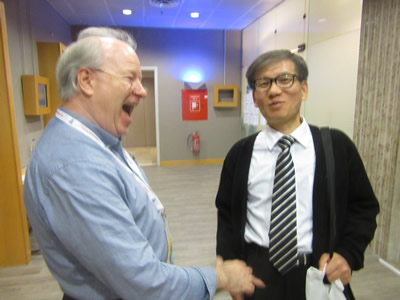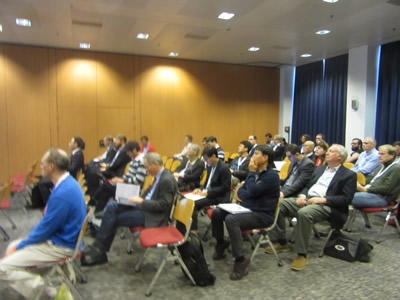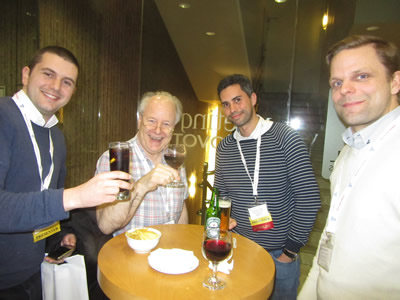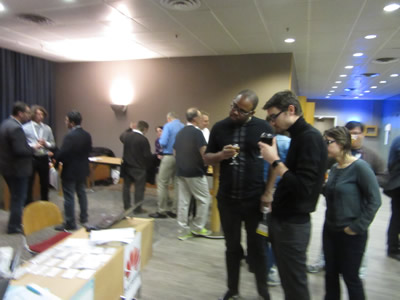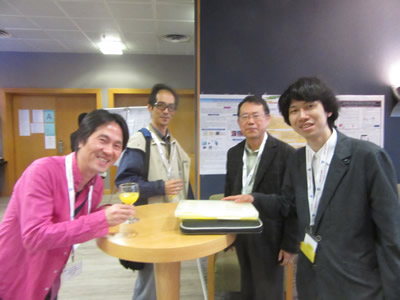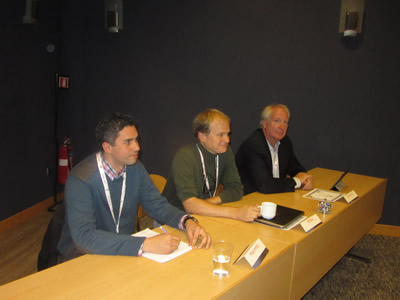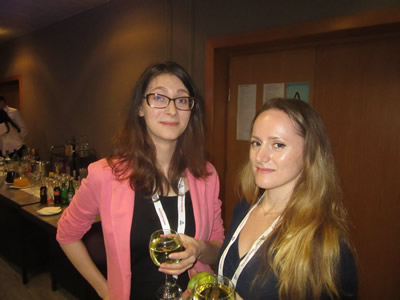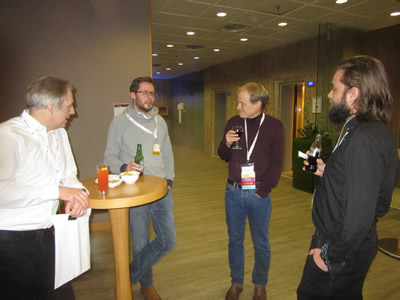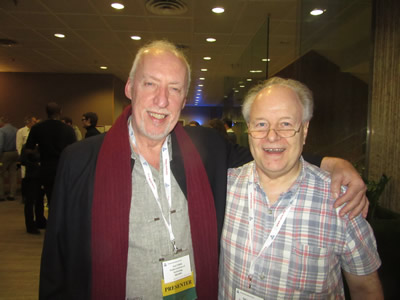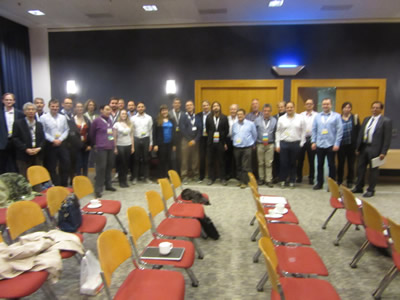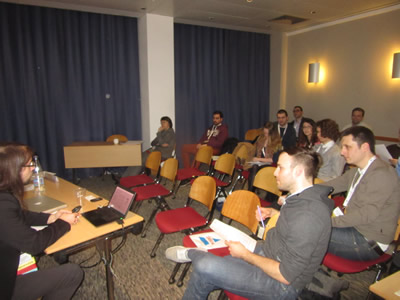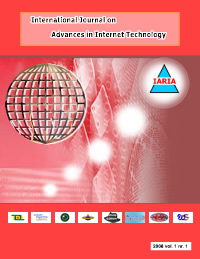EMERGING 2018 - The Tenth International Conference on Emerging Networks and Systems Intelligence
November 18, 2018 - November 22, 2018
EMERGING 2018: Call for Papers
Next-generation large distributed networks and systems require substantial reconsideration of exiting ‘de facto’ approaches and mechanisms to sustain an increasing demand on speed, scale, bandwidth, topology and flow changes, user complex behavior, security threats, and service and user ubiquity. As a result, growing research and industrial forces are focusing on new approaches for advanced communications considering new devices and protocols, advanced discovery mechanisms, and programmability techniques to express, measure and control the service quality, security, environmental and user requirements.
The event EMERGING 2018, The Tenth International Conference on Emerging Networks and Systems Intelligence, constitutes a stage to present and evaluate the advances in emerging solutions for next-generation architectures, devices, and communications protocols. Particular focus is aimed at optimization, quality, discovery, protection, and user profile requirements supported by special approaches such as network coding, configurable protocols, context-aware optimization, ambient systems, anomaly discovery, and adaptive mechanisms.
We solicit both academic, research, and industrial contributions. We welcome technical papers presenting research and practical results, position papers addressing the pros and cons of specific proposals, such as those being discussed in the standard fora or in industry consortia, survey papers addressing the key problems and solutions on any of the above topics short papers on work in progress, and panel proposals.
Industrial presentations are not subject to the format and content constraints of regular submissions. We expect short and long presentations that express industrial position and status.
Tutorials on specific related topics and panels on challenging areas are encouraged.
The topics suggested by the conference can be discussed in term of concepts, state of the art, research, standards, implementations, running experiments, applications, and industrial case studies. Authors are invited to submit complete unpublished papers, which are not under review in any other conference or journal in the following, but not limited to, topic areas.
All topics and submission formats are open to both research and industry contributions.
EMERGING 2018 conference tracks:
Computing trends
Computational science; Cloud computing; Cluster, Grid, and P2P computing; Big Data Processing; Machine to Machine computing; High Performance Computing; Mobile computing; Knowledge Management; Social Computing; Sentiment analytics; Bio-inspired computation; Natural language processing; Computational social systems
Mobility and Ubiquity
Mobile Cloud; Cloud-based mobile services and applications; Mobile Internet services; Mobility-oriented protocols /Mobile IP, etc./; Wearable and/or mobile technologies; Self-discovery and localizing entities; Seamless handover; Ubiquitous computing; Pervasive and embedded systems; Ubiquitous sustainability; Sensing location; Citizen activity patterns; Smart environments in the workplaces; Ubiquitous cities; Internet of Things architectures; Autonomous and autonomic systems; Self-manageable systems
Intelligent services
Service-oriented smart cities; Cognitive and collaborative radio; Autonomic and dependable communications; Ambient systems; Identity and location in mobile environments; Smart homes; Brain-like networking and computing; Resource discovery; Service discovery; Content discovery; Flaws/anomaly discovery; Semantics and Adaptation; Content-aware networks; Network-aware applications; Semantic Web; Adaptive systems; Adaptive applications; Self-adaptiveness; Ontology-based adaptation; Semantic profile; Semantic service orchestration; Multi-technology semantic integration (sensors, ehealth, geosensing, etc.)
Applications and services
Smart communication; Citizen-oriented services; Peer-to-Peer applications and services; Web services; Mobile applications; Entertainment and games; Home automation; Surveillance, Home monitoring; Medical and health applications; e-commerce, m-commerce; Location-based services; Real-time and multimedia applications; Real-time services over IP; Business intelligence; Web-based analytics; e-Commerce services; Disaster management
Technology and networking trends
Advanced communications systems; Clouds-based systems; Scalable data centers; New configurable protocols stacks and real-time mechanisms; Massive uncoordinated access protocols; Applications and services for next-generation architectures; Scalability and manageability of network architectures; Opportunistic and cooperative communications; Optical networks; Wireless networks; Mobile networks; Ad-Hoc, Sensor, Vehicle networks; Access, Residential, Last mile networks; Home, Body and Personal area Networks; Self-organizing networks; Storage area networks; Peer-to-Peer and overlay networks; Network measurements and testbeds; Transmission technologies (e.g., Ultra Wideband); Wireless access technologies / WLANs, WiMAX, satellite, 5G, etc./; Multi-hop wireless networks /sensor, ad hoc, mesh, etc.; Open spectrum solutions
Vision and image related trends
Visual computation; Image processing; Remote sensing; Human computer interaction; Computer vision; Robotics vision; Geographic Information Systems (GIS); Video analysis; Medical diagnosis; Visual brain models; Augmented reality; Virtual reality; Visual atmosphere models; Visual city interactive maps; Image mining; Multimedia and visualization; Media storage, indexing, and retrieval; Visualizing multi-dimensional data, textual data, multimedia data; Visualization infrastructures, services and applications for specific domains
Networking and service differentiation
Network design and planning; Network management and control; Traffic engineering; Traffic control, Flow control; Congestion and admission control; QoS support and Performance; Routing, Switching, QoS routing; Mobility management; Multicast; Service reliability, availability, robustness; Network coding; Visualization of network behavior; Semantic routing; Network flow processing; Cross-layer design and optimization; High-speed networking; Context-aware mobile networking; Bio-inspired networks
Intelligent network elements and programmability
Network processors; Content addressable memories; Multi-core processors; Context-aware reconfigurable devices; Portable and wearable devices; Mobile multimedia devices; Programmable and real-time network traffic measurements; Adaptive scheduling; Network and application load balancing; High-performance capabilities-based networks; Software techniques to improve virtualized I/O performance
Quality and optimization
Quality of service; Quality of performance; Quality of experience; Quality of data; Quality of modeling; Quality-oriented routing; Quality of context /degradation, trust, uncertainty, consistency; Quality of experience; Power optimization in data centers; Delay and fault tolerant networks; Video conferencing and telepresence systems; Resource optimization; Context-aware optimization
Security, Trust, Privacy
Trust and credential negotiations; Privacy; Intrusion prevention and containment; Security in virtualization approach; Architectural support for security; Security, privacy, and dependability; Security in cooperative networks; Anticipative control and management; Data protection strategies; Collaborative Internet attack containment; Micro-kernels and robustness; Surveillance; Biometrics; Electronic Data Interchange (EDI); Cyber Security; Cryptography; Secure protocols
Energy and electronics
E-waste; Energy-efficiency methods on sustainable ICT; Energy-efficiency in data centers; Energy efficiency in cloud computing; Green Computing; Smart Grids; Energy in Sensing and Sensor Networks; Energy-aware digital circuits; Energy optimization in analog circuits and signal processing techniques; Energy saving in assembly and packaging
User-centric
User-centric services and applications; User-oriented analytics; Frequently changing user profile; User mobility and ubiquity; Scalable and resource intensive multi-user distributed applications; User identity and multi-service access technologies; End-user perception; End-user based networking and service orchestration; End-user activity recognition with multiple goals; e-Learning; Web-based learning; Gamming; Emerging computation business models; Social networks; e-Society; Interaction accessibility and usability
Deadlines:
Submission | Aug 01, 2018 |
Notification | Sep 04, 2018 |
Registration | Sep 17, 2018 |
Camera ready | Sep 25, 2018 |
Deadlines differ for special tracks. Please consult the conference home page for special tracks Call for Papers (if any).
INSTRUCTION FOR THE AUTHORS
Authors of selected papers will be invited to submit extended versions to one of the IARIA Journals.
Publisher: XPS (Xpert Publishing Services)
Archived: ThinkMindTM Digital Library (free access)
Prints available at Curran Associates, Inc.
How to submit to appropriate indexes.
Only .pdf or .doc files will be accepted for paper submission. All received submissions will be acknowledged via an automated system.
Contribution types
- regular papers [in the proceedings, digital library]
- short papers (work in progress) [in the proceedings, digital library]
- ideas: two pages [in the proceedings, digital library]
- extended abstracts: two pages [in the proceedings, digital library]
- posters: two pages [in the proceedings, digital library]
- posters: slide only [slide-deck posted on www.iaria.org]
- presentations: slide only [slide-deck posted on www.iaria.org]
- demos: two pages [posted on www.iaria.org]
FORMATS
Only .pdf or .doc files will be accepted for paper submission. All received submissions will be acknowledged via an automated system.
Final author manuscripts will be 8.5" x 11", not exceeding 6 pages; max 4 extra pages allowed at additional cost.
Helpful information for paper formatting for MS Word can be found here.
There is a community provided LaTeX template: the CTAN package iaria (with full IARIA formatting rules, including IARIA citation style, but for providing citation style it is tightly bound to pdflatex+biblatex+biber). In addition, there is also iaria-lite (not bound to pdflatex+biblatex+biber, but compatible with any TeX stack; thus, it cannot provide the IARIA citation formattings, but only the titlepage and content-related IARIA formatting rules). Based on the iaria package, there is a minimal working example as Overleaf template. When you are using the LaTeX templates, please still adhere to the additional editorial rules.
Slides-based contributions can use the corporate/university format and style.
Your paper should also comply with the additional editorial rules.
Once you receive the notification of contribution acceptance, you will be provided by the publisher an online author kit with all the steps an author needs to follow to submit the final version. The author kits URL will be included in the letter of acceptance.
We would recommend that you should not use too many extra pages, even if you can afford the extra fees. No more than 2 contributions per event are recommended, as each contribution must be separately registered and paid for. At least one author of each accepted paper must register to ensure that the paper will be included in the conference proceedings and in the digital library, or posted on the www.iaria.org (for slide-based contributions).
CONTRIBUTION TYPE
Regular Papers (up to 6-10 page article -6 pages covered the by regular registration; max 4 extra pages allowed at additional cost- ) (oral presentation)
These contributions could be academic or industrial research, survey, white, implementation-oriented, architecture-oriented, white papers, etc. They will be included in the proceedings, posted in the free-access ThinkMind digital library and sent for indexing. Please submit the contributions following the instructions for the regular submissions using the "Submit a Paper" button and selecting the appropriate contribution type. 12-14 presentation slides are suggested.
Short papers (work in progress) (up to 4 pages long) (oral presentation)
Work-in-progress contributions are welcome. These contributions represent partial achievements of longer-term projects. They could be academic or industrial research, survey, white, implementation-oriented, architecture-oriented, white papers, etc. Please submit the contributions following the instructions for the regular submissions using the "Submit a Paper" button and selecting the contribution type as work in progress. Contributors must follow the conference deadlines, describing early research and novel skeleton ideas in the areas of the conference topics. The work will be published in the conference proceedings, posted in the free-access ThinkMind digital library and sent for indexing. For more details, see the Work in Progress explanation page. 12-14 presentation slides are suggested.
Ideas contributions (2 pages long) (oral presentation)
This category is dedicated to new ideas in their very early stage. Idea contributions are expression of yet to be developed approaches, with pros/cons, not yet consolidated. Ideas contributions are intended for a debate and audience feedback. Please submit the contributions following the instructions for the regular submissions using the "Submit a Paper" button and selecting the contribution type as Idea. Contributors must follow the conference deadlines, describing early research and novel skeleton ideas in the areas of the conference topics. The work will be published in the conference proceedings, posted in the free-access ThinkMind digital library and sent for indexing. For more details, see the Ideas explanation page. 12-14 presentation slides are suggested.
Extended abstracts (2 pages long) (oral presentation)
Extended abstracts summarize a long potential publication with noticeable results. It is intended for sharing yet to be written, or further on intended for a journal publication. Please submit the contributions following the instructions for the regular submissions using the "Submit a Paper" button and selecting the contribution type as Extended abstract. Contributors must follow the conference deadlines, describing early research and novel skeleton ideas in the areas of the conference topics. The work will be published in the conference proceedings, posted in the free-access ThinkMind digital library and sent for indexing. 12-14 presentation slides are suggested.
Posters (paper-based, two pages long) (oral presentation)
Posters are intended for ongoing research projects, concrete realizations, or industrial applications/projects presentations. The poster may be presented during sessions reserved for posters, or mixed with presentation of articles of similar topic. A two-page paper summarizes a presentation intended to be a POSTER. This allows an author to summarize a series of results and expose them via a big number of figures, graphics and tables. Please submit the contributions following the instructions for the regular submissions using the "Submit a Paper" button and selecting the contribution type as Poster Two Pages. Contributors must follow the conference deadlines, describing early research and novel skeleton ideas in the areas of the conference topics. The work will be published in the conference proceedings, posted in the free-access ThinkMind digital library and sent for indexing. 8-10 presentation slides are suggested. Also a big Poster is suitable, used for live discussions with the attendees, in addition to the oral presentation.
Posters (slide-based, only) (oral presentation)
Posters are intended for ongoing research projects, concrete realizations, or industrial applications/projects presentations. The poster may be presented during sessions reserved for posters, or mixed with presentation of articles of similar topic. The slides must have comprehensive comments. This type of contribution only requires a 8-10 slide-deck. Please submit the contributions following the instructions for the regular submissions using the "Submit a Paper" button and selecting the contribution type as Poster (slide-only). The slide-deck will be posted, post-event, on www.iaria.org.
8-10 presentation slides are suggested. Also a big Poster is suitable, used for live discussions with the attendees, additionally to the oral presentation.
Presentations (slide-based, only) (oral presentation)
These contributions represent technical marketing/industrial/business/positioning presentations. This type of contribution only requires a 12-14 slide-deck. Please submit the contributions following the submission instructions by using the "Submit a Paper" button and selecting the contribution type as Presentation (slide-only). The slide-deck will be posted, post-event, on www.iaria.org.
12-14 presentation slides are suggested.
Demos (two pages) [posted on www.iaria.org]
Demos represent special contributions where a tool, an implementation of an application, or a freshly implemented system is presented in its alfa/beta version. It might also be intended for thsoe new application to gather the attendee opinion. A two-page summary for a demo is intended to be. It would be scheduled in special time spots, to ensure a maximum attendance from the participants. Please submit the contributions following the submission instructions by using the "Submit a Paper" button and selecting the contribution type as Demos. The Demos paper will be posted, post-event, on www.iaria.org.
Tutorial proposals
Tutorials provide overviews of current high interest topics. Proposals should be for 2-3 hour long. Proposals must contain the title, the summary of the content, and the biography of the presenter(s). The tutorial slide decks will be posted on the IARIA site.
Please send your proposals to tutorial proposal
Panel proposals
The organizers encourage scientists and industry leaders to organize dedicated panels dealing with controversial and challenging topics and paradigms. Panel moderators are asked to identify their guests and manage that their appropriate talk supports timely reach our deadlines. Moderators must specifically submit an official proposal, indicating their background, panelist names, their affiliation, the topic of the panel, as well as short biographies. The panel slide deck will be posted on the IARIA site.
Please send your proposals to panel proposal
